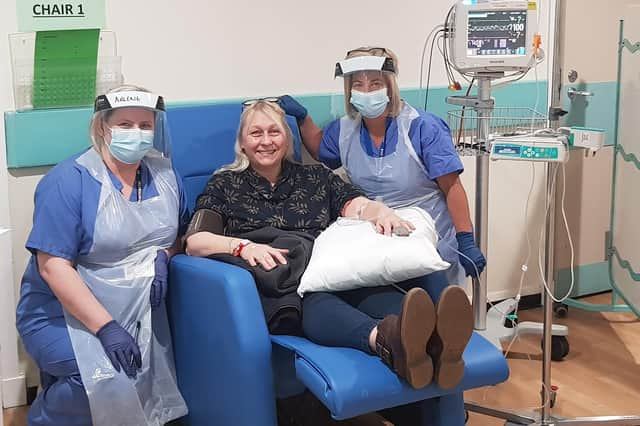NHS Tayside delivers new Covid treatment to first patient


It follows the recent announcement by the Scottish Government that new treatments are available across Scotland.
Penny Hepburn, who lives near Kinross, said she was “honoured” to be the first patient in Tayside to receive the ground-breaking monoclonal antibodies intravenous infusion.
Advertisement
Hide AdAdvertisement
Hide AdThe treatment provides an additional layer of support to eligible patients who are considered high risk due to underlying health conditions.
Following clinical assessment, Penny, who has Crohn’s Disease/Colitis and is immunosuppressed, was invited to Ninewells Hospital to receive the treatment recently and did not hesitate to say yes.
She said: “I said yes straight away, I wanted to get straight on it. Anything that helps the recovery and can make you feel better is worthwhile.
“I feel absolutely fantastic that I have been able to get this new treatment. I was a little nervous to be honest but the whole team have been amazing. They have explained things so clearly and have taken super care of me.”
Advertisement
Hide AdAdvertisement
Hide AdThose aged 12 or over are eligible to be assessed for treatment if they are thought to be at high risk with a clinical condition or are taking certain immunosuppressant medications. They must also have received a positive PCR test for Covid and have symptoms of Covid-19 that started in the last five days.
A clinician will then assess whether the new therapies are suitable for them. If eligible, they will be contacted with further information on how to access the medicines. Individuals who may be eligible will also be written to in early January to provide them with further information and home PCR test kits.
Lead clinical pharmacist Arlene Shaw said: “The treatment is a neutralising antibody treatment which aims to minimise deterioration of Covid-19 in high risk patients in the early stages of the disease, reducing the risk of hospital admissions and subsequent death. However, it is important to say the treatments are in addition to vaccinations and don’t replace them. Getting vaccinated is still the most important step that anyone can take to minimise the impact of Covid-19.”
This is the second time that Penny has dealt with COVID-19 after being diagnosed with the virus earlier this year. The 53-year-old said she was keen to protect herself as much as possible and urged others to do the same.
Advertisement
Hide AdAdvertisement
Hide AdPenny added: “I got Covid-19 at the start of the year too and it made me feel very ill. It felt like more than just a cold. My senses felt overloaded, every breath I was taking was heavy, my legs felt like lead. You did wonder when you were going to feel better and it was frightening.
“As soon as I was offered the vaccines, I didn’t hesitate - I got them as soon as I could. I said yes to this new treatment as soon as I was told about it. This treatment gives me an assurance. I have been offered everything that is possibly available to protect me. That assurance is the best thing to have been given.
“The best message I can give to people is to take COVID-19 seriously. It can be so harmful so please get vaccinated if you are eligible and accept this treatment if you can be offered it.”
Full details about the new treatments can be found at Coronavirus (COVID-19): Treatments | NHS Inform.